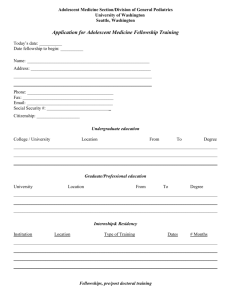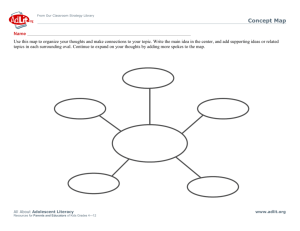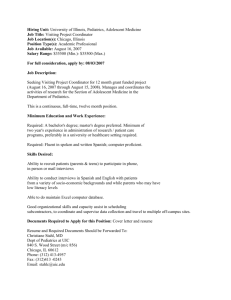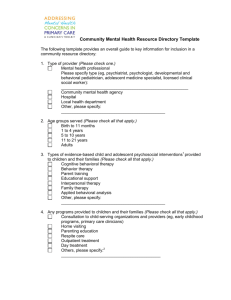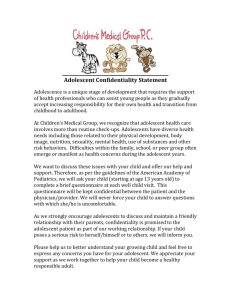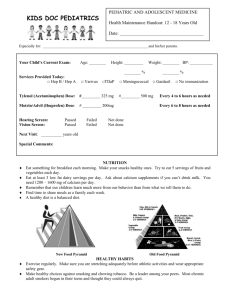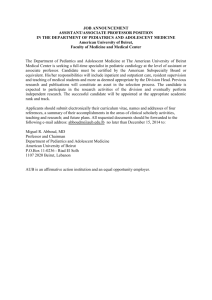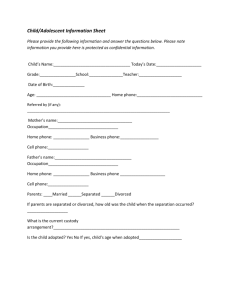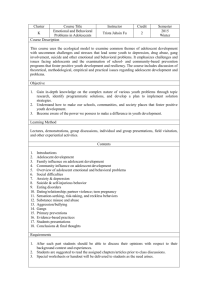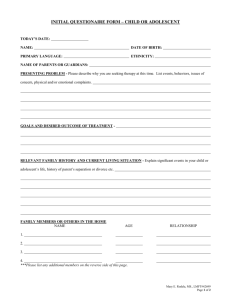7-11 Years - Kids Doc Pediatrics
advertisement
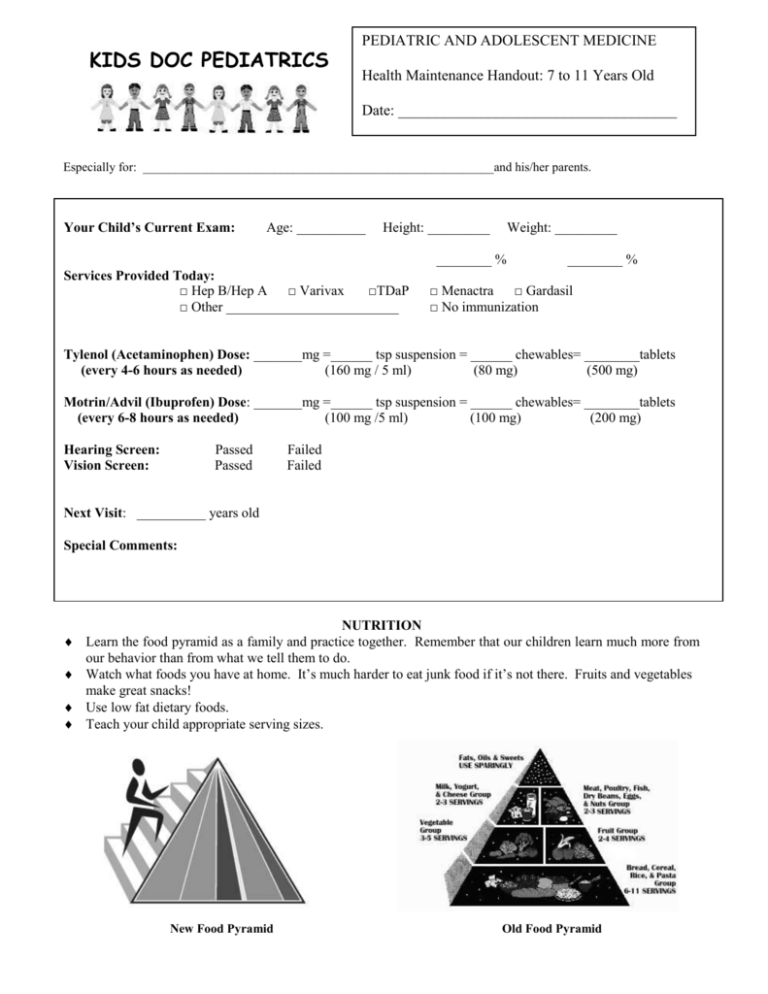
KIDS DOC PEDIATRICS PEDIATRIC AND ADOLESCENT MEDICINE Health Maintenance Handout: 7 to 11 Years Old Date: _____________________________________ Especially for: ________________________________________________________and his/her parents. Your Child’s Current Exam: Age: __________ Height: _________ Weight: _________ ________ % Services Provided Today: □ Hep B/Hep A □ Varivax □TDaP □ Other _________________________ ________ % □ Menactra □ Gardasil □ No immunization Tylenol (Acetaminophen) Dose: _______mg =______ tsp suspension = ______ chewables= ________tablets (every 4-6 hours as needed) (160 mg / 5 ml) (80 mg) (500 mg) Motrin/Advil (Ibuprofen) Dose: _______mg =______ tsp suspension = ______ chewables= ________tablets (every 6-8 hours as needed) (100 mg /5 ml) (100 mg) (200 mg) Hearing Screen: Vision Screen: Passed Passed Failed Failed Next Visit: __________ years old Special Comments: NUTRITION Learn the food pyramid as a family and practice together. Remember that our children learn much more from our behavior than from what we tell them to do. Watch what foods you have at home. It’s much harder to eat junk food if it’s not there. Fruits and vegetables make great snacks! Use low fat dietary foods. Teach your child appropriate serving sizes. New Food Pyramid Old Food Pyramid HEALTHY HABITS Encourage routine physical activity. Plays ball, rides a bike, and takes a walk. Keep moving and keep your hearts healthy. Minimize sedentary activities such as television, video games, and computer games. Choose what you watch wisely. Encourage children to participate in this decision-making with a weekly TV-time budget. Parents should monitor the shows their children are watching. See a dentist twice yearly. Brush teeth after every meal and prior to sleep. Floss daily. Talk openly about the risks of cigarette/alcohol/drug use and set good examples. Let your children know they can talk to you about these issues which they will face soon. Let them know that you trust them to make wise decisions and begin fostering these decision making skills now. Read! Read together and out loud. Exercise their brain. BEHAVIOR/DEVELOPMENT Establish rules and guidelines and enforce logical consequences if they are not followed. Help your child to be responsible for his or her actions and the consequences that follow. Encourage age appropriate decision making. Comfortably answer questions about sex. It is better for our children to learn about this from us than from the media or their peers. See recommended books below. Review these in advance before introducing them to your child. Prepare your child for the changes that will occur during puberty. SAFETY Always wear a seat belt in the car. Children under 12 are safer in the backseat. Beware of potential dangers from the passenger side airbags. Never ride with someone who has been drinking alcohol. Always wear a helmet when you bike roller skate, or skateboard Sunscreen! (SPF of 15 or above). Never swim alone. Learn how to swim if you don’t know already know. Never play with a gun. Guns may be dangerous. Every 2 hours a child is killed by a gun in the U.S. If you have a gun in the home we encourage you place it in a safe place (locked and stored separately from the ammunition). Recognize the risk of leaving your child home alone. Most children are not developmentally prepared for this responsibility at this age. FUTURE VISITS As you child enters adolescence, we will encourage them to begin assuming responsibility for their health. We will often perform part of the interview and examination with the parents out of the exam room. It is most helpful if we know about your concerns in advance. We maintain confidentiality regarding our discussions with adolescent patients. We will inform parents if an adolescent is posing a threat to him/herself or someone else. We encourage you to maintain open communication with your adolescent. SUGGESTED READING 1,2, 3 Magic (Effective Discipline), Thomas Phelan It’s Perfectly Natural, Planned Parenthood (a well done book on sex, geared towards pre and early adolescents) Caring for your Adolescent: Ages 12 to 21, American Academy of Pediatrics Caring for Your School Aged Child: Ages 5 to 12, American Academy of Pediatrics Your Ten to Fourteen Years Old, Louise Bate Ames, PhD Raising a Child Conservatively in a Sexually Permissive World, Sol Gordon, PhD and Judith Gordon, MSW How To Talk So Kids Will Listen and Listen So Kids Will Talk, Adele farber and Elaine Mazlish This is an important period in which to foster the growth of our children in becoming independent individuals capable of making wise decisions for themselves and accepting responsibility for their actions. Let them know you are there for them, always.

